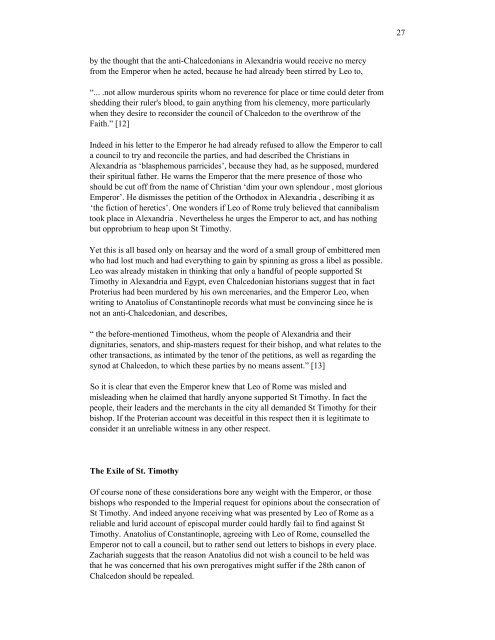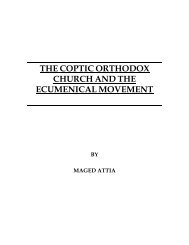Coptic interpretations of the Fourth Ecumenical Council - Saint Mina ...
Coptic interpretations of the Fourth Ecumenical Council - Saint Mina ...
Coptic interpretations of the Fourth Ecumenical Council - Saint Mina ...
You also want an ePaper? Increase the reach of your titles
YUMPU automatically turns print PDFs into web optimized ePapers that Google loves.
y <strong>the</strong> thought that <strong>the</strong> anti-Chalcedonians in Alexandria would receive no mercy<br />
from <strong>the</strong> Emperor when he acted, because he had already been stirred by Leo to,<br />
“... .not allow murderous spirits whom no reverence for place or time could deter from<br />
shedding <strong>the</strong>ir ruler's blood, to gain anything from his clemency, more particularly<br />
when <strong>the</strong>y desire to reconsider <strong>the</strong> council <strong>of</strong> Chalcedon to <strong>the</strong> overthrow <strong>of</strong> <strong>the</strong><br />
Faith.” [12]<br />
Indeed in his letter to <strong>the</strong> Emperor he had already refused to allow <strong>the</strong> Emperor to call<br />
a council to try and reconcile <strong>the</strong> parties, and had described <strong>the</strong> Christians in<br />
Alexandria as ‘blasphemous parricides’, because <strong>the</strong>y had, as he supposed, murdered<br />
<strong>the</strong>ir spiritual fa<strong>the</strong>r. He warns <strong>the</strong> Emperor that <strong>the</strong> mere presence <strong>of</strong> those who<br />
should be cut <strong>of</strong>f from <strong>the</strong> name <strong>of</strong> Christian ‘dim your own splendour , most glorious<br />
Emperor’. He dismisses <strong>the</strong> petition <strong>of</strong> <strong>the</strong> Orthodox in Alexandria , describing it as<br />
‘<strong>the</strong> fiction <strong>of</strong> heretics’. One wonders if Leo <strong>of</strong> Rome truly believed that cannibalism<br />
took place in Alexandria . Never<strong>the</strong>less he urges <strong>the</strong> Emperor to act, and has nothing<br />
but opprobrium to heap upon St Timothy.<br />
Yet this is all based only on hearsay and <strong>the</strong> word <strong>of</strong> a small group <strong>of</strong> embittered men<br />
who had lost much and had everything to gain by spinning as gross a libel as possible.<br />
Leo was already mistaken in thinking that only a handful <strong>of</strong> people supported St<br />
Timothy in Alexandria and Egypt, even Chalcedonian historians suggest that in fact<br />
Proterius had been murdered by his own mercenaries, and <strong>the</strong> Emperor Leo, when<br />
writing to Anatolius <strong>of</strong> Constantinople records what must be convincing since he is<br />
not an anti-Chalcedonian, and describes,<br />
“ <strong>the</strong> before-mentioned Timo<strong>the</strong>us, whom <strong>the</strong> people <strong>of</strong> Alexandria and <strong>the</strong>ir<br />
dignitaries, senators, and ship-masters request for <strong>the</strong>ir bishop, and what relates to <strong>the</strong><br />
o<strong>the</strong>r transactions, as intimated by <strong>the</strong> tenor <strong>of</strong> <strong>the</strong> petitions, as well as regarding <strong>the</strong><br />
synod at Chalcedon, to which <strong>the</strong>se parties by no means assent.” [13]<br />
So it is clear that even <strong>the</strong> Emperor knew that Leo <strong>of</strong> Rome was misled and<br />
misleading when he claimed that hardly anyone supported St Timothy. In fact <strong>the</strong><br />
people, <strong>the</strong>ir leaders and <strong>the</strong> merchants in <strong>the</strong> city all demanded St Timothy for <strong>the</strong>ir<br />
bishop. If <strong>the</strong> Proterian account was deceitful in this respect <strong>the</strong>n it is legitimate to<br />
consider it an unreliable witness in any o<strong>the</strong>r respect.<br />
The Exile <strong>of</strong> St. Timothy<br />
Of course none <strong>of</strong> <strong>the</strong>se considerations bore any weight with <strong>the</strong> Emperor, or those<br />
bishops who responded to <strong>the</strong> Imperial request for opinions about <strong>the</strong> consecration <strong>of</strong><br />
St Timothy. And indeed anyone receiving what was presented by Leo <strong>of</strong> Rome as a<br />
reliable and lurid account <strong>of</strong> episcopal murder could hardly fail to find against St<br />
Timothy. Anatolius <strong>of</strong> Constantinople, agreeing with Leo <strong>of</strong> Rome, counselled <strong>the</strong><br />
Emperor not to call a council, but to ra<strong>the</strong>r send out letters to bishops in every place.<br />
Zachariah suggests that <strong>the</strong> reason Anatolius did not wish a council to be held was<br />
that he was concerned that his own prerogatives might suffer if <strong>the</strong> 28th canon <strong>of</strong><br />
Chalcedon should be repealed.<br />
27








